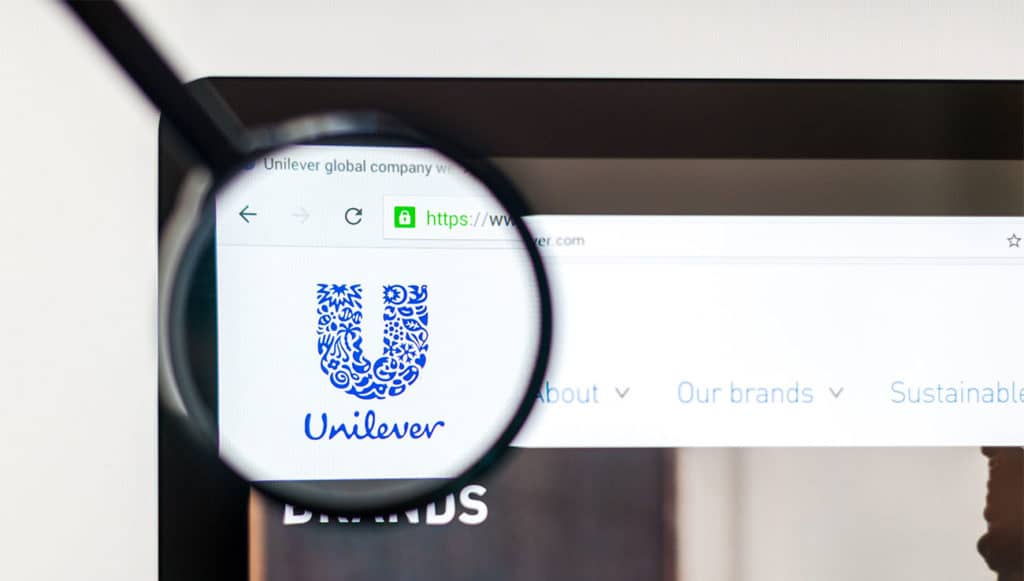

41%
improvement in overall productivity
~700,000
unlocked hours
67%
of opportunities are assigned to female employees
With the World Economic Forum predicting that 50% of the global workforce will need to reskill by 2025, Unilever wanted to equip their employees with the knowledge needed to thrive in the next chapter of work. To bring their workforce up to speed, the leading consumer goods enterprise chose to launch an internal talent marketplace that aligns every employee with growth opportunities that fulfill their vision of purposeful work.
Future-fit skills are the currency that gets you meaningful experiences for a purposeful career. With Gloat, we can further accelerate our transformation towards a more agile, innovative, and empowered organization.
Jeroen Wels, EVP of HR
Unilever is a multinational consumer goods company headquartered in London. For nearly a century, the enterprise has met everyday needs for nutrition, hygiene, and personal care with brands that help people feel good, look good, and get more out of life. Each of Unilever’s 149,000 employees unites under the organization’s core purpose: to make sustainable living commonplace.


Ongoing learning has always been at the heart of Unilever’s culture. With the World Economic Forum predicting that 50% of the global workforce will need to reskill by 2025, the pioneering consumer goods enterprise wanted to equip their employees with the competencies needed to thrive in the next chapter of work.
As Unilever’s VP, Future of Work, Patrick Hull notes,
We identified early on this need for more talent mobility, more flexibility, and continuous learning. Everyone was talking about the importance of lifelong learning, so we decided it was time to scan the market for tools and ideas that we could implement to make an impact within our organization.
Patrick Hull, VP Future of Work Unilever
The enterprise created four objectives that would guide their journey.
These goals included:
As the world of work continues to change, Unilever wanted to ensure that no employee got left behind. After recognizing the immense value of experiential learning, the enterprise decided to create an in-house flexible working program to match people with project opportunities in other areas of the business. This initiative would be underpinned by an AI-powered platform to allow leaders to resource projects at speed.
One of Unilever’s core beliefs is that people with purpose thrive. The enterprise chose to introduce Future Fit plans to ensure learning experiences align with every individual’s unique definition of purposeful work. After clarifying their purpose, employees would then be matched with relevant projects, gigs, and mentorship opportunities that would help them pursue their own idea of meaningful work
Some of our secret sauce is around purpose. We believe that a lot of the talk around upskilling is treating people like they’re widgets. In reality, each person is unique and has a unique set of passions and strengths. So we know we need to always start our reskilling journey from a place of purpose.
Patrick Hull, VP, Future of Work
While Unilever devised their upskilling and reskilling strategy prior to the pandemic’s onset, COVID-19 would soon reinforce the paramount importance of agility. As business priorities pivoted rapidly, the enterprise introduced a campaign called “Raise a hand, lend a hand.”
This strategy would enable Unilever to swiftly redeploy talent to support areas of the business with increased demand. As their EVP of HR, Jeroen Wels, explains:
The campaign was designed to benefit our employees and our team leads. Managers could raise their hands when they needed help and people with capacity could step in and jump on that.
To help people pursue their own definitions of purposeful work, Unilever sought to create transparency around the opportunities within their business. By leveling the playing field and giving each team member equal visibility, Unilever could ensure every candidate selected for a project was truly the best fit for that role.
Wels affirms the importance of democratizing opportunities.
We wanted to bring agility to placing the right people, in the right place, at the right time. This project was about augmenting AI-enabled technology to disrupt the way we develop our talent and how we staff our teams.
Unilever’s upskilling and reskilling initiative stemmed from an understanding that technology is quickly changing how we work. In a world that is ever more digital, it’s only fitting that the enterprise looked to a digital platform to bring their workforce into the future.
Leaders recognized that a talent marketplace could prove mutually beneficial by matching employees seeking purpose-driven learning opportunities to projects and gigs posted by managers searching for an extra set of hands.
Unilever started by launching a pilot version of their marketplace, FLEX Experiences, to approximately 1,000 employees. Months after, the onset of the COVID-19 pandemic signaled a pressing need to scale up by rolling it out to employees across the globe.
Global HR Business Partner Yanpi Oliveros Pascual describes the transition, noting, “When COVID hit, we saw FLEX become even more relevant. We saw part of our business become overstretched, while, on the other hand, there were employees who suddenly had more capacity because projects were reprioritized. To ensure business continuity, we all had to work as one Unilever and FLEX Experiences made that possible.”
In addition to igniting a powerful business transformation, FLEX Experiences has also empowered many Unilever team members to transform their own careers. Vanessa Otake is one such employee. After 18 years in R&D, Otake used FLEX Experiences to apply for an opportunity that allowed her to further explore her passion for diversity and female leadership. A 6-week, 20% project soon opened the door for a future position with the team as a D&I Manager.
Today, Otake spearheads Unilever’s Gender agenda. Reflecting on her journey, she says, “FLEX Experiences gave me an opportunity to bring my purpose and work closer together. Now that I’m in this role, I feel like a kid in a sweet shop. I’m back into learning again, growing again, and being able to grow with something that I’m really passionate about.”
41%
improvement in overall productivity
70%
assignments are cross-functional
unlocked hours
of opportunities are assigned to female employees
As Otake’s story indicates, the impact of FLEX Experiences is nothing less than transformational. Many women like Otake have used the platform to evolve and progress their careers, as evidenced by a recent usage stat which shows that nearly two-thirds of FLEX opportunities are assigned to female employees. While the gender breakdown at Unilever is an equal 50:50 split, women have taken the lead when it comes to utilizing the talent marketplace to push their careers forward.
FLEX Experiences has also proven crucial to thriving amidst the disruptions caused by COVID-19. Within the first two months of the pandemic’s onset, Unilever leveraged their talent marketplace to staff more than 700 business-critical projects and unlock more than 26,000 hours. More than 60% of assignments were staffed cross-country, which Wels acknowledges “…could never have happened in a non-digital life, because you would’ve been stuck in your team. Now if you’re in the US, you can help out in Canada, in Germany, and in the UK. So that was a fantastic insight that changed the way we work.”
His colleague, Patrick Hull, expresses a similar sentiment, noting: “FLEX Experiences has been a real game-changer for us. We see it as more than just a platform, it’s a mindset. It’s bringing our people along and shifting their mindset from relying on the people they see in front of them to a far more flexible, resourcing mindset.”
Rather than looking at just one metric to measure FLEX’s success, Hull is quick to note that the platform has a myriad of impacts. “There’s a productivity dividend, there’s an attrition dividend, and we’re reducing time to hire. So all of these commitments have both a business benefit and a social benefit, which is why this really felt like an idea that deserved our attention in the first place.”
The success of FLEX Experiences, and the powerful role it plays in bringing the workforce into the future, hasn’t gone unnoticed by Unilever’s CEO, Alan Jope. In summarizing their experience, he says, “Agile ways of working are allowing us to redeploy both temporary and permanent resources to support our strategic priorities. Our Internal Talent Marketplace has helped us to re-prioritize 500,000 worker hours towards more than 3,000 business-critical projects.”
This info will help our workforce agility experts personalize your experience.